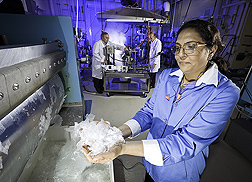
Agribusiness is not so happy with author Michael Pollan. (Alia Malley)
When Michael Pollan published “The Omnivore’s Dilemma” in 2006, he became an overnight hero for the sustainable food movement. Now he’s taking on a new role: lightning rod.
Pollan’s scheduled speech Thursday at California Polytechnic has raised the ire of Harris Ranch Beef Company, an industrial-sized feedlot and meat-processing operation based in Selma, Calif. Company chairman David E. Wood, an alumnus of Cal Poly, objected to giving Pollan “an unchallenged forum to promote his stand on conventional agricultural practices” and threatened to withdraw a promised corporate $500,000 donation for a meat-processing facility on campus.
In response to the criticism, Cal Poly reformatted the event. Instead of giving a speech, Pollan will now participate in a panel discussion that will also include Gary Smith, a professor of meat science at Colorado State University, and Myra Goodman, cofounder of organic vegetable company Earthbound Farms.
Until recently, agribusiness had not directly challenged Pollan and other well-known advocates of sustainable agriculture, casting them as impractical elitists. But Pollan’s growing appeal to college students and children – a new young reader’s edition of “The Omnivore’s Dilemma” is released today – may have spooked conventional producers. Harris Ranch, which operates a large-scale feedlot that accomodates 100,000 head of cattle, for example, believes Pollan’s message must be combated...










